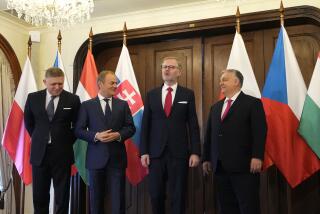Czech-German Bid to Mend Ties Advances
- Share via
MUNICH, Germany — The foreign ministers of Germany and the Czech Republic signed a declaration aimed at mending a bilateral relationship that remains strained half a century after the end of World War II.
But critics in both countries complained that the initiative was only making matters worse.
The ceremonial step, taken in the ornate Great Hall of the Cernin Palace in Prague, marked the end of two years of extremely disputatious negotiations.
The Czech Republic is the last of the countries occupied by Nazi Germany to fully normalize its relationship with the Federal Republic.
Even today, with the war a fading memory, compromise continues to be so difficult that virtually every word in the declaration is said to have been the source of disagreement.
The compromise declaration must now be approved by both countries’ parliaments, then signed by the heads of government.
German Foreign Minister Klaus Kinkel said at a news conference Friday that Bonn will now be motivated to “give special priority” to the Czech Republic’s entry into the European Union and NATO, despite objections from Moscow.
His Czech counterpart, Josef Zieleniec, while saying he was happy that the negotiations were over, expressed continuing uncertainty that the two countries had solved their problems.
“I’m glad that the two societies were able, for the most part, to agree on the clarification of the black chapters of our recent history,” he said, but added: “The declaration which we have negotiated simply means a clarification of minds. I have said to myself already, ‘This declaration is not a full stop at the end of history. It merely closes one sentence, one paragraph.’ ”
The central theme of the declaration is an agreement not to let bitterness over the past mar the future--a potentially bright future that is already coming to pass on the German-Czech border, where bilateral trade and investment are thriving.
In the declaration, Bonn expresses regret for the Nazi occupation of Czech lands from 1939-45. Prague, in turn, says it regrets the brutal expulsion of 2.5 million ethnic Germans from the former Czechoslovakia’s Sudetenland region at the end of World War II. Both sides agree to create a Czech-German Future Fund that will finance environmental, historical and scientific projects, especially those that in some way help the victims of the Third Reich.
In Germany, the “Sudeten Germans”--most of whom now live in Bavaria--complain through their official association that the declaration ignores their central grievance: That no one has ever compensated them for land and homes they lost in what they consider a Czech-led “ethnic cleansing.”
*
The declaration does not address landownership questions--a political nonstarter in the Czech Republic.
“From the legal point of view, the property question is closed,” Czech negotiator Alexander Vondra said.
Czech critics, meanwhile, said Friday that the document wrongly put the brutal Czech expulsions on an equal footing with the much-graver crimes of the Nazis. They also worried that it might undermine the ability of Nazi victims to ever claim direct compensation.
Times special correspondent Iva Drapalova in Prague contributed to this report.
More to Read
Sign up for Essential California
The most important California stories and recommendations in your inbox every morning.
You may occasionally receive promotional content from the Los Angeles Times.












